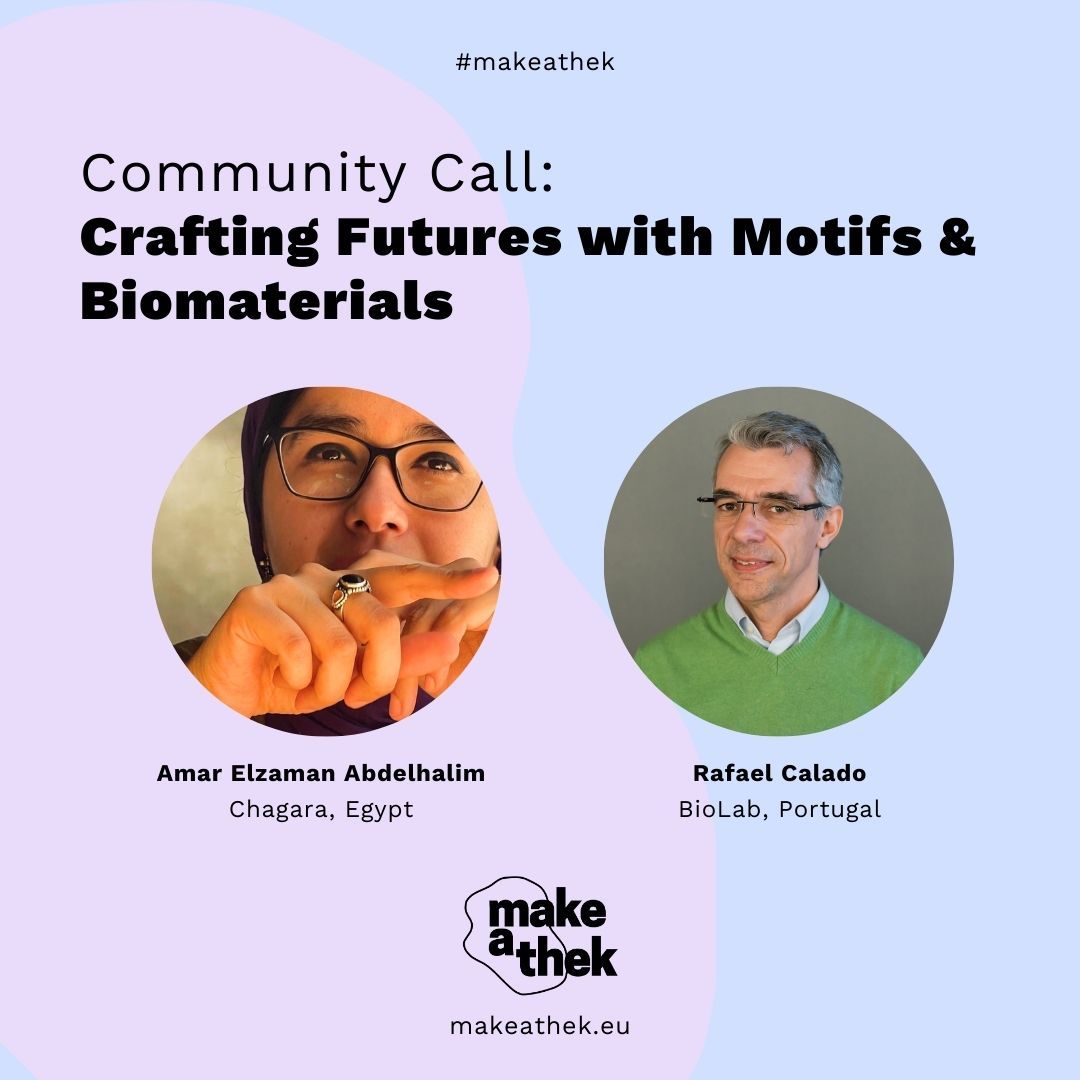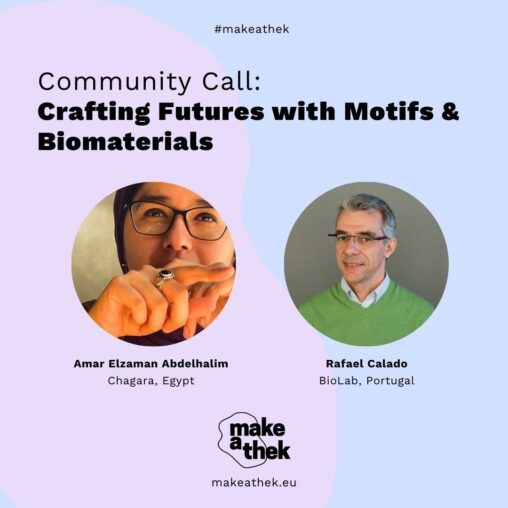The Global Innovation Gathering (GIG) recently hosted another insightful session as part of its Make-a-thek Community Calls, a series integral to the EU Horizon project “MAKE-a-thek”. This ambitious project aims to build and activate maker spaces within Europe’s library network, with a dedicated focus on sustainable fashion. These maker spaces are envisioned as vibrant community hubs, empowering individuals to engage in various forms of making, repairing, and creation, all centred on the crucial theme of sustainability, particularly within the fashion industry. Previous calls have explored diverse facets of sustainability, including traditional crafts from regions like Iraq and Ukraine, fostering rich discussions.
This particular call brought together two inspiring speakers from different corners of the world, though geographically “north” in a broader sense: Oamar Abdaleim from Egypt, founder of Chagara textiles, known for his work with traditional patterns and natural dyes, and Rafael Calado from Portugal, a long-standing member of the Fab Lab network and founder of Biolab, specialising in biomaterials. Their combined expertise promised a fascinating dialogue, revealing numerous overlaps and shared visions.
Oamar Abdaleim, initially trained as an architect, shared a deeply personal journey that led him into the world of textiles. A profound personal loss prompted her to question the nature of modern professional practice, particularly the perceived separation between one’s work and personal life. This introspection fueled a quest for self-expression that architecture, in its professional constraints, could not fully provide at the time. This quest ultimately led her to pursue a master’s degree in textile design in London, where the curriculum encouraged exploring self-expression within contemporary craft and design, despite his background in architecture.
Her work with Chagara textiles is not merely about replicating traditional designs, but rather about a deeper connection to them. Oamar explained that his approach involves reinterpreting the smallest elements of design – the motif – to relate to universal human feelings, such as loss, transforming them into symbols that can be universally understood. She views this as a way to bridge the gap created by modern life’s emphasis on efficiency and machinery, which often divorces emotional connection from the production process. Her initial dream was inspired by the romanticised idea of a village where mothers engage in block printing and natural dyeing, with fabrics flowing through homes and being washed in rivers.
The establishment of Chagara Textiles was a challenging, decade-long endeavour. Oamar learned the intricate techniques of block printing and natural dyeing in Jodhpur, Rajasthan, India. Upon returning to Egypt, she faced the daunting task of “inventing a whole industry that is not there anymore”. This involved teaching apprentices, experimenting tirelessly with different types of wood for blocks, and adapting to local water and plant materials for dyes. This process continues to require constant experimentation due to the varying shades of the material. Her co-founder, Noir, an architect colleague, played a crucial role in pushing the initiative towards a business model, providing the belief that the unique products could be sold. Despite the passion, the high costs and niche market for these ethically produced, intricately crafted fabrics remain significant challenges, requiring dedication to preserve the specialised know-how.
Rafael Calado’s path to biomaterials also stemmed from a growing awareness of sustainability issues, specifically within his architectural practice and his role as a Fab Lab coordinator. He observed that while Fab Labs championed digital fabrication and distributed production, they unfortunately generated a significant amount of waste, including plastics and solvents. Recognising that even “recycled plastic” could still produce harmful microparticles, Rafael felt a strong pull towards a different direction. Eight years ago, he founded a Repair Cafe, connecting him with efforts to repair various items, including clothes, marking his initial foray into the sustainable sphere. This journey led him to convince the city council and a university to support the creation of Biolab, which officially opened its doors in 2022.
Biolab’s core mission is to create materials that do not harm nature, moving beyond mere sustainability towards a regenerative approach. Rafael emphasised that the goal is not just to be sustainable, but to actively repair what has been damaged. The lab, open to the community, primarily attracts designers, architects, and artists who are drawn to tactile materials. They work with a fascinating array of living materials, including algae for threads, bacteria for biochromes (colouring), and even kombucha and mycelium. Biolab also engages in projects like regenerative menus, working with local river resources to create new materials.
The potential applications of biomaterials explored at Biolab are vast and have a significant impact. Rafael highlighted three key areas with substantial real-life potential: packaging, a major contributor to global waste; construction materials; and the clothing industry. For instance, Biolab is developing bioceramics from oyster shells that do not require high-temperature firing in kilns, a revolutionary step for the construction industry. In fashion, biomaterials offer alternatives, such as vegan leathers cultivated from bacteria and fungus, as well as new dyes produced by bacteria. While these innovations are currently expensive, Rafael noted that many can even be made in a home lab, suggesting a future where localised, sustainable production could become more accessible.
A crucial aspect of Biolab’s work is its dialogue between traditional techniques and material innovation. When asked if Biolab helps preserve traditional crafts, Rafael confirmed their deep involvement. The lab actively translates old manuals from the 18th and 19th centuries, uncovering forgotten formulas for materials like spider silk, natural dyes, and fish-scale glues. They collaborate with designers who work with traditional materials, such as Tunisian designers utilising olive tree fibres for packaging and paper, and basketry designers who are now mixing their craft with bioceramics and lab-produced dyes. Even techniques like block printing and screen printing are being explored with new, naturally derived dyes produced in the lab.
Both speakers candidly addressed the complexities and often overlooked challenges within the realm of “sustainable” practices. Rafael acknowledged that Fab Labs, despite their innovative nature, generate considerable waste. Oamar revealed that while natural dyes are environmentally friendly, they can be water-intensive and may lead to waste due to the unpredictable nature of colour outcomes. She also shared a personal experience where working with chemical dyes for screen printing had a significant impact on her health, leading her to explore natural alternatives. The consensus was that while these alternative methods might not be “100% sustainable,” they represent a significantly “better” choice when compared to the highly damaging conventional methods. This interplay between historical wisdom and future invention is genuinely at the intersection of the past and the future.

Rafael concluded with a powerful reflection: sustainability should be revised, moving towards a regenerative way of working. He proposed that in any project, there should be someone explicitly responsible for representing “non-speakers” – like nature itself – ensuring that environmental considerations are not merely an afterthought but an integral part of the design and implementation. Oamar’s journey also highlights the ongoing quest for reconciliation between personal expression and professional practice. The discussions emphasised the very real struggles involved in translating such innovative and ethically driven work into viable business models in the modern world.
The Global Innovation Gathering extends its heartfelt gratitude to Oamar Abdaleim and Rafael Calado for their incredible input, openness, and honesty in sharing their unique experiences and the compelling stories behind their work. As highlighted in the call, the story is equally as important as the product, and the values discussed—from bridging tradition and innovation to embracing regenerative practices—are applicable across myriad fields beyond sustainable fashion. We encourage everyone to explore their fascinating work in more detail.
- Discover Chagara textiles: http://chagara.com/, Instagram: https://www.instagram.com/chagaratextiles/.
- Learn more about Biolab: https://biolablisboa.pt/, Instagram: https://www.instagram.com/biolablisboa/.
- Explore Make-a-thek: https://www.instagram.com/makeathek/.
Stay tuned for our next Make-a-thek Community Call, where we look forward to welcoming two incredible speakers from Latin America for another inspiring global conversation.

make-a-thek has received funding from the European Horizon Europe programme under grant agreement No. 101177660.


